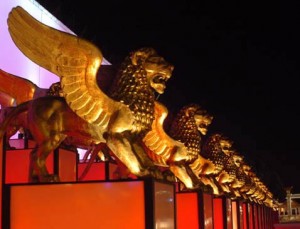Four Films shot in Apulia at the 69th Venice Film Festival
The Apulia Film Commission will be present at the 69th Venice Film Festival with four films shot in Apulia; “E’ stato il figlio”, main festival entry directed by Daniele Ciprì, “La nave dolce”, a documentary directed by Daniele Vicari, conceived and co-produced by the Apulia Film Commission, “La Sala”, a short directed by Alessio Giannone, produced by Bari City Council, co-produced by the Apulia Film Commission and “Carmela, salvata dai filibustieri” directed by Giovanni Maderna (entered in the “Cinema Corsaro” Section), produced with the support of the Apulia Film Commission.
Apulian cinema will be represented by four film productions at the 69th Venice International Film Festival, directed by Alberto Barbera and running from 29th August to 8th September 2012.
Three films were shot within the region with the operational and economic support of the Apulia Film Commission: “E’ stato il figlio” directed by Daniele Ciprì (entered in the main Venezia 69 festival), the documentary “La nave dolce” directed by Daniele Vicari (special event not entered in festival), conceived and co-produced by the Apulia Film Commission with Indigo Film, and the short “La sala” directed by Alessio Giannone (entered in the “Orizonti” section), produced by Bari City Council with the Apulia Film Commission. Finally, the film “Carmela, salvata dai filibustieri” directed by Giovanni Maderna, shot in Taranto with the support of the Apulia Film Commission, has been entered in the new “Cinema Corsaro” section during Writers’ Day, directed by Giorgio Gosetti.
Starting with the main festival entry “E’ stato il figlio” directed by Daniele Ciprì, the film stars Toni Servillo and also features Giselda Volodi, Fabrizio Falco, Aurora Quattrocchi, Benedetto Raneli, Piero Misuraca and a guest appearance by Alfredo Castro. It is a story set in Palermo, but shot entirely within Apulia, in and around Brindisi, underlining yet again the quality of Apulian locations which can lend themselves to a huge variety of settings.
Based on Roberto Alajmo’s novel of the same name, “E’ stato il figlio” tells the true story of a poor family 1970s Palermo; Nicola, his wife Loredana, their children Tancredi and Serenella and grandparents Fonzio and Rosa. The whole family lives together in a precarious domestic situation which is just steady enough within its limits. The film, which goes on general release on 14th September, is distributed by Fandango and is an Italian-French co-production by Passione and Babe Films in collaboration with Rai Cinema and Palomar, in association with Aleteia Communication Faro Film. It was supported by funding from the Film Department of the Ministry for Heritage and Culture and the Apulia Film Commission.
For the documentary “La nave dolce”, directed by Daniele Vicari, the Apulia Film Commission played a crucial role both in the creation and production of the film project. The film, co-produced by Indigo Film and Rai Cinema, was the first in Italy to actively involve a film commission in its production process, the Apulia Film Commission. “La nave dolce” recounts in a surprising and original way the dramatic arrival of the ship “Vlora” in the port of Bari on 8th August 1991. On board were approximately 20,000 Albanians.
“Like the film “Diaz” – says Vicari-, “La nave dolce” is a film which imposed itself on me and forced me to overcome the narrative pattern of three acts, borrowing wider-based structures from classical tragedy and prose. The two films are a radical challenge to my limits as a storyteller, I must admit. They are two “monsters” that have made me suffer and rejoice in a way that has never happened before”.
“Carmela, salvata dai filibustieri”, directed by Giovanni Maderna (entered in the new “Cinema Corsaro” section) features Mimmo and Sussò Boccuni and Carmela Lupoli. The film was shot in Taranto with the assistance of the Apulia Film Commission. Produced by Quarto Film in collaboration with Rai Cinema and Fuori Orario (Rai Tre), the film was inspired by “Jolanda, la figlia del Corsaro Nero” (Yolanda, Daughter of the Black Pirate) directed by Emilio Salgari. It tells the story of Carmaux and Wan Stiller (Mimmo and Sussò), fishermen from the Old Town, who are searching for Carmela of Ventimiglia. An ancient, visionary Morgan has sent them through childhood memories, fear of imprisonment and opposed destinies, related in an arcane and mysterious language. The (free) life of today’s pirates in the beautiful city of Taranto.
Finally, the short “La sala”, directed by Alessio Giannone, has been entered in the section entitled “Orizzonti (Horizons) – New Currents in World Cinema”. The film is the result of a project carried out with convicts from Bari district prison who became screenwriters for the occasion. The short tells the story of a southern Italian wedding which is merely a ploy to expose the goings-on within a family hiding a great deal of contradictions. “La sala” was co-produced by Bari Council’s Office for Non-Oppressive Conflict in collaboration with the Apulia Film Commission.



